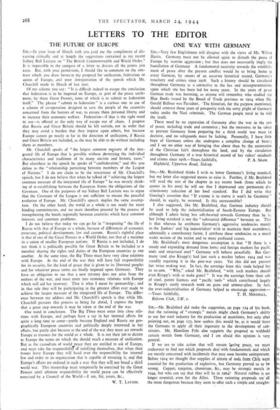Sit,—Mr. Brailsford thinks I wish to lower Germany's living standard,
but my letter also suggested means to raise it. Further, if Mr. Brailsford will read the rest of the chapter in my recent boOk (from which he quotes in his own) he will sec that I deprecated any permanent dis- criminatory reduction of her food standard. But I did write that Goering's assertion that "If anyone is to starve it won't be Germany should, in equity, be reversed. Is this unreasonable?
I also suggested, like Mr. Brailsford, that German industry should be used to help the industrialisation of South-Eastern Europe. But although I admit being less soft-hearted towards Germany than he is, her living standard is not the " substantial difference " between us. This is that whereas he attributes Germany's aggressive tendencies mainly to the Junkers' and big industrialists' wish to maintain their ascendency, admittedly a contributory factor, I attribute these tendencies to a much wider section of the nation and to more profound causes.
Mr. Brailsford's most dangerous assumption is that " If there is a steady and expanding demand from home and foreign markets for pacific tools and structural steel " Germany will behave peacefully. But Ger- many (and also Krupp's) had just such a market before 1914 and was steadily regaining it in the post-war years. Yet this did not prevent her twice making war. In fact, the earnings from this trade helped her to re-arm. " Why," asked Mr. Brailsford, " with such markets should even Krupp's wish to make guns? " It was the earnings from their sale
of steel, patent licences and " pacific tools " which contributed largely to Krupp's costly research work on guns and armour-plate. In fact, the over-industrialisation of Germany helped to encourage aggression.-


























 Previous page
Previous page